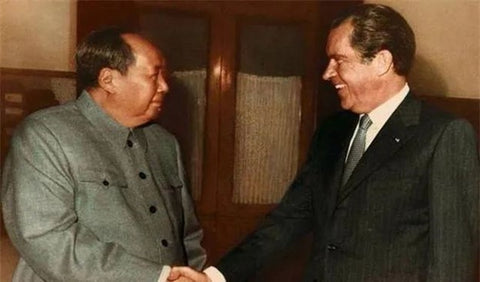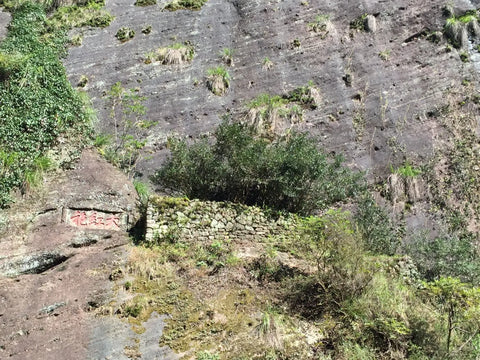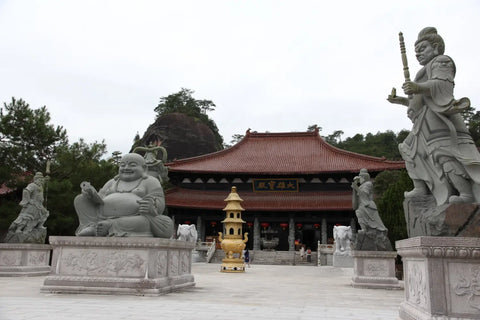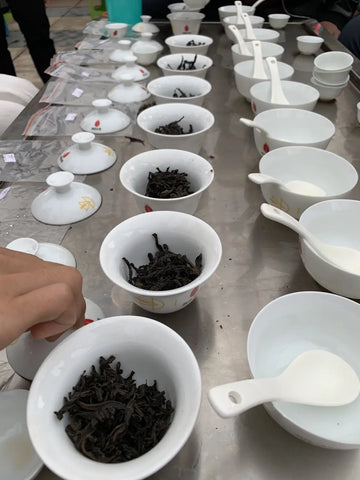
What You Need to Know About Da Hong Pao
Fifty-one years ago, on Feb. 21st, 1972, history took a major turn. Chinese Chairman Mao gave the visiting President Richard Nixon of the United States, a welcome gift, a thoughtfully chosen famous Chinese oolong tea Da Hong Pao, with just 400 grams in a gift box. Chairman Mao was a tea drinker, and liked to drink concentrated tea as well. At the time it seemed that President Nixon was puzzled for a bit having been given such a small amount of tea. Realizing the confusion, China's prime minister Zhou Enlai explained to President Nixon that this 400g of tea was actually China's most precious tea, from the mother bushes of the famed Wuyi Da Hong Pao, which produced only 800g from an entire year's crop. So, with his witty tone Premier Zhou said that Chairman Mao actually gave you "half of the country". President Nixon smiled. Putting this into context, the value of this gift would be equivalent to a million dollars today.

Legend always comes with a great story. The rich history of Da Hong Pao goes back to the Ming dynasty, more than seven hundred years ago. A scholar was on his way to Beijing for a very important imperial exam, an important step in becoming prosperous and achieving high social ranking during China’s dynasties. He was sick when he passed by Wuyi mountain, and the head monk of Tianxin Temple found him and gave him some Wuyi mountain tea to drink. He recovered after several days and went on to Beijing and scored highest on the exam. He was given a big red robe as a reward by the emperor. Upon his glorious homecoming, he went back to Wuyi Tianxin Temple to thank the monk. After he realized that the tea had made him well, he put his big red robe on the tree bushes out of respect and honor. He later presented the tea to the emperor’s wife for her illness, and the emperor rewarded him with a big red robe again and asked him to put it on the tree bushes. The tea has since become well-known as well as the tea’s name, Da Hong pao. It became one of China’s ten most famous teas.

The mother bushes of Da Hong Pao are said to be more than 350 years old (see the picture below). In 2006, the Wuyi mountain local government decided to halt harvesting from the mother bush to preserve its life. But the Wuyi mountain tea institute has been cultivating and working on propagating the varietal since the 1980s. Fast-forwarding to today, Da Hong Pao remains one of the prominent Wuyi Rock Teas along with Rou Gui and Shui Xian varietals. Nowadays the majority of Da Hong Pao on the market are blended to mimic the amazing original taste, thanks to the Wuyi skilled tea masters. Although blending may not sound exciting, great masters can blend highly desirable Da Hong Pao that represents the very essence of Wuyi rock tea, that is “Rock bone and floral fragrance”.

It is normal to encounter one great-tasting Da Hong Pao and find another to be subpar as the blending Da Hong Pao is really a work of art and requires years of experience and a great set of skills. It is a breakthrough from the more traditional pure varietal, giving tea drinkers the option for a different delicacy. I am a believer of purity in taste, but Da Hong Pao is on a different scale in its own right and makes it accessible for Wuyi tea lovers. It is a truly beautiful example of the old adage “one plus one is greater than two”.
To taste and appreciate this distinguished specialty tea, we can discern the quality of the tea based on these three factors:
- First steep, look at the liquor and smell the aroma: the liquor should be clear with a golden and reddish-brown color. Smell the floral fragrance. Floral notes don’t have to be very strong, but pure and last long to the end. The high quality ones are those that have the fragrances melted in the liquor.
- Second steep, taste the liquor: How is the texture of the liquor? Is it smooth and full-bodied? Does it taste bitter? Does it goes down your throat smoothly? Does it taste naturally sweet and smooth?
- Third steep, feel the Yun (韵): Yun is hard to explain, and it takes a lot of drinking experience to be able to sense it. However, excellent Wuyi tea does have that special Yun that connoisseurs look for, the “rock bone, floral fragrance.” Feel the liquor in your mouth and your tongue, does the tea give you pleasure? Does it produce moisture in your throat? Does the moisture stay in your mouth afterwards? If we don’t taste much of the Yun, we can still simply feel the sensory pleasure that a great quality tea brings. Per my own experience, tasting tea in this way is a satisfying sensory experience, but also brings mental pleasure and cultural appreciation. It is more like an art of tasting, or a tasting of art, whichever way we feel fits best.
For the tea farmers, tea factories and producers, making great tea is hard work, but is also enjoyable and comes with responsibility and pride. It is a tradition for Wuyi mountain locals to hold many annual open tea competitions at various events, usually two or three days long. The major categories in the competition are Rou Gui, Shui Xian, and Da Hong Pao, with each category involving dozens of rounds or hundreds of competition teas.


At open competitions, everyone at the table can rate the tea, along with the professional judges, and the winners get awarded big prizes. Get a glimpse of the Wuyi tea competitions in the photos above. In her sourcing trips to Wuyi Mountain, Victoria attended a couple of those competitions and drank a lot of competition teas. It was so much fun and a great learning experience. Feel free to ask her if she got tea drunk afterwards. :-)
Since you've read this far, why not give it a try? Click here to view our superb offering of this wonderful tea.
